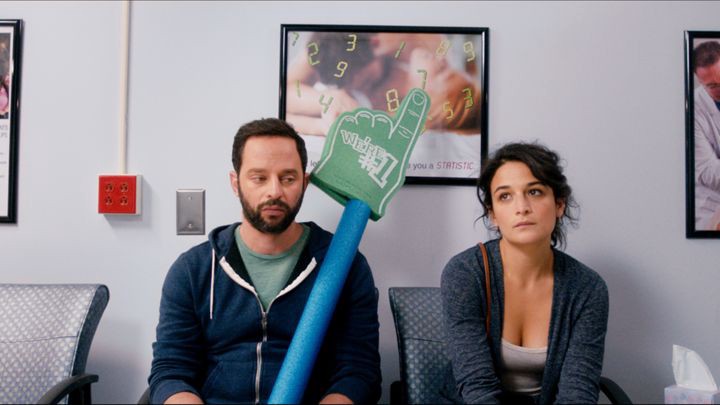Sophie Goodhart began her career in news and documentaries for UK television. “My Blind Brother” originated as a short. The short version of the film screened in competition at Cannes in 2003, where it was nominated for the Palme d’ Or, and was also screened at SXSW, Melbourne, Sao Paulo, and London film festivals. Goodhart went on to write several films with The Barnes Brothers, including “The Locksmith” and “Sex Guaranteed.”
“My Blind Brother” opens in theaters September 23. It will be available On Demand and on iTunes the same day.
W&H: Describe the film for us in your own words.
SG: A blind athlete (Adam Scott) and his underachieving brother (Nick Kroll) both fall for the same woman (Jenny Slate). The movie is a story about guilt, resentment, and trying to do the right thing.
W&H: What drew you to this story?
SG: I love stories about guilt. “My Blind Brother” is partly based on my feelings after my sister was diagnosed with multiple sclerosis — I was deeply ashamed to discover that after the initial shock and sadness I had twinges of jealousy.
W&H: What do you want people to think about when they are leaving the theater?
SG: Love, their own actions, and ego.
W&H: What was the biggest challenge in making the film?
SG: I was eight months pregnant when we shot and I was editing four days after the birth.
W&H: How did you get your film funded? Share some insights into how you got the film made.
SG: Tory Tunnell optioned the movie and then she searched for a financier. There were some false starts and a lot of moments where I thought it was never going to happen. We [eventually] found Tyler Davidson who financed it and produced it in Ohio.
W&H: What’s the best and worst advice you’ve received?
SG: Best advice: Wait for the right actors.
Worst advice: Shoot at any cost.
W&H: What advice do you have for other female directors?
SG: Don’t give up: delusion is your friend.
W&H: Name your favorite woman-directed film and why.
SG: The 1972 version of “The Heartbreak Kid,” directed by Elaine May. It’s probably my all-time favorite film. I think women can often say darker things in a less unpleasant and more digestible way. It’s such a bold film, but it’s still funny, real, and totally enjoyable.
W&H: Have you seen opportunities for women filmmakers increase over the last year due to the increased attention paid to the issue? If someone asked you what you thought needed to be done to get women more opportunities to direct, what would be your answer?
SG: Perhaps now women are getting more opportunities due to the increased attention, but I also feel like it was starting to happen anyway: their arrival pushed the agenda rather than the other way around. The fact is that there are a lot of women watching and making movies, and we have interesting things to say. It’s just a surprise it took so long.
If someone asked me what would lead to more opportunities for women to direct, I’d say hiring women executives.







